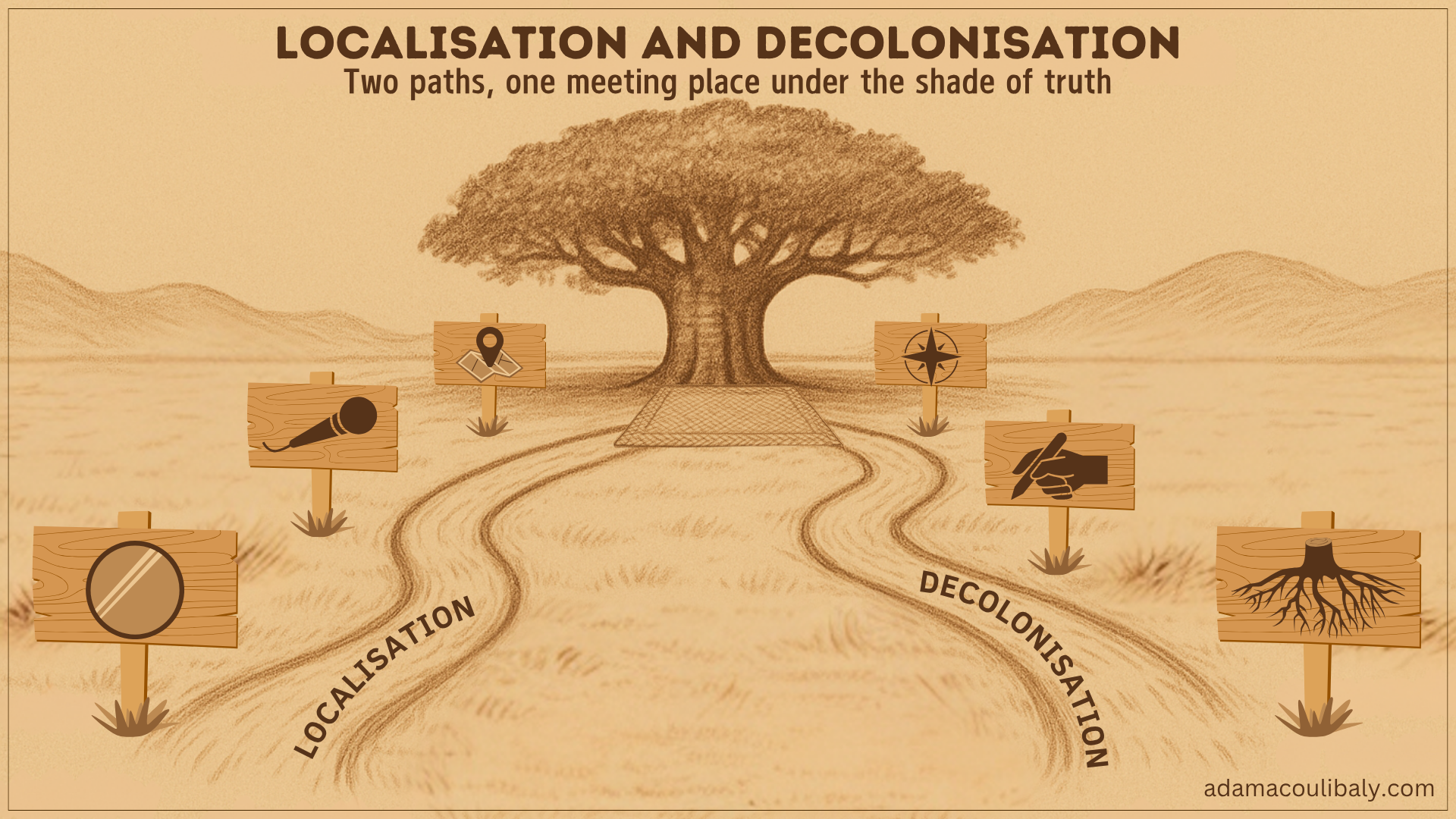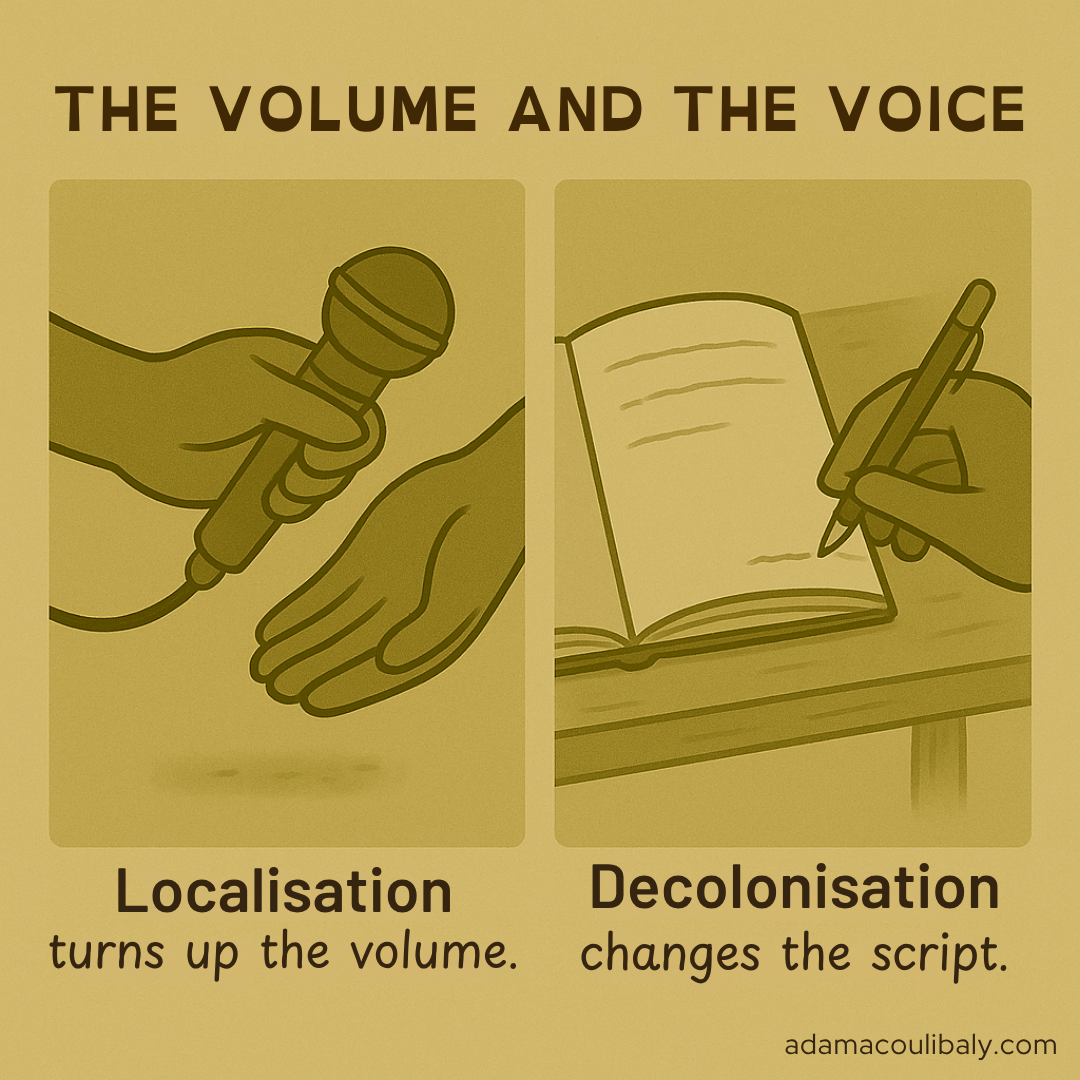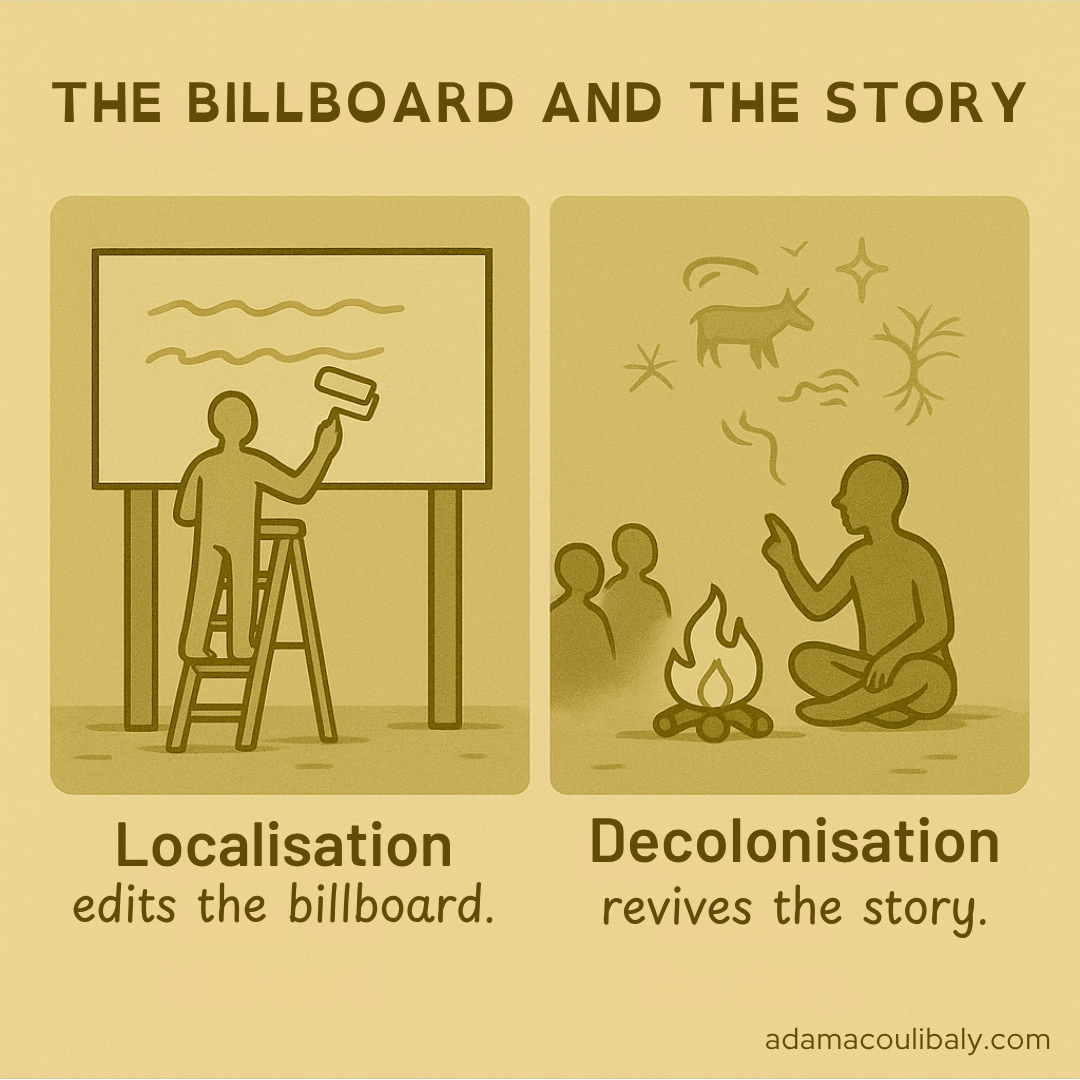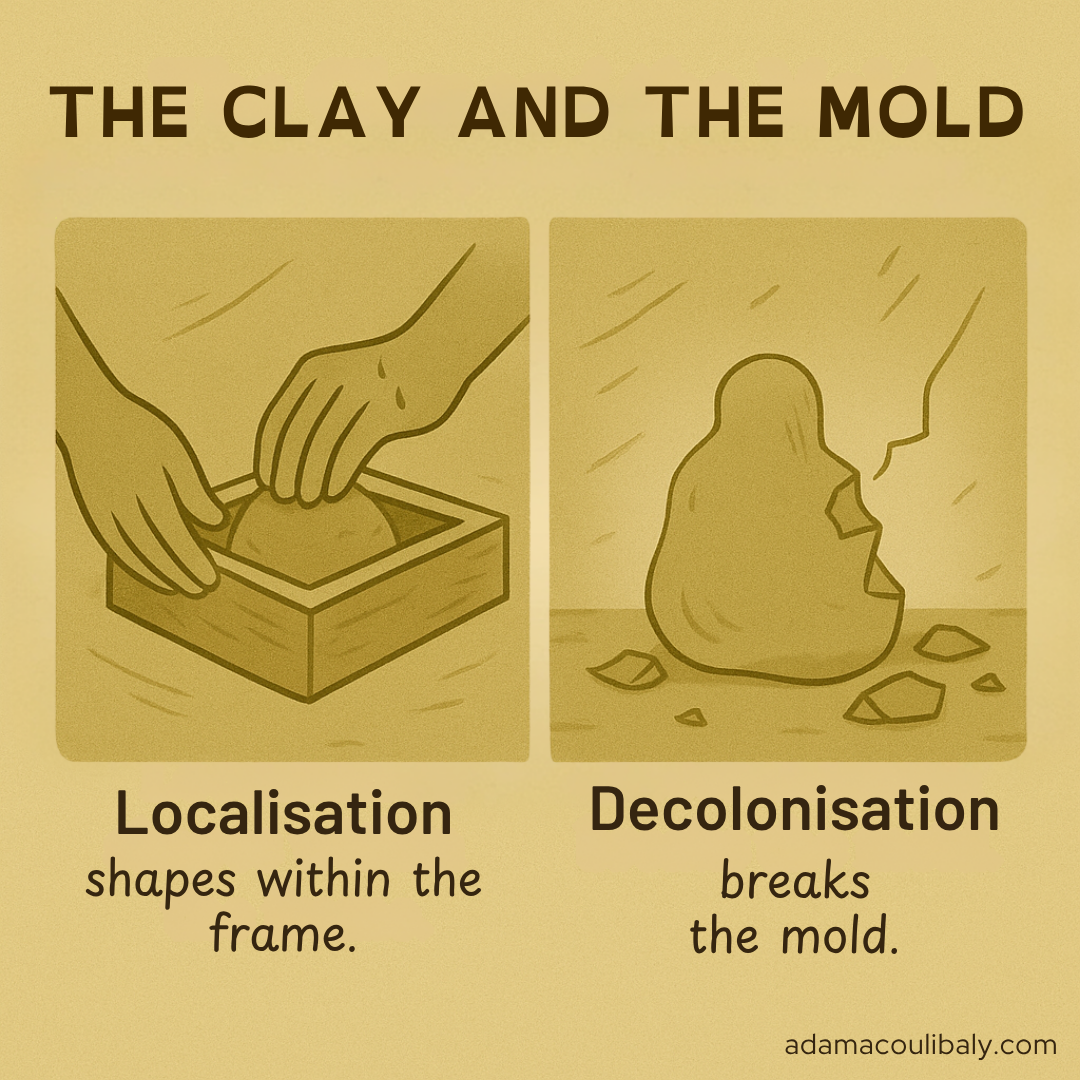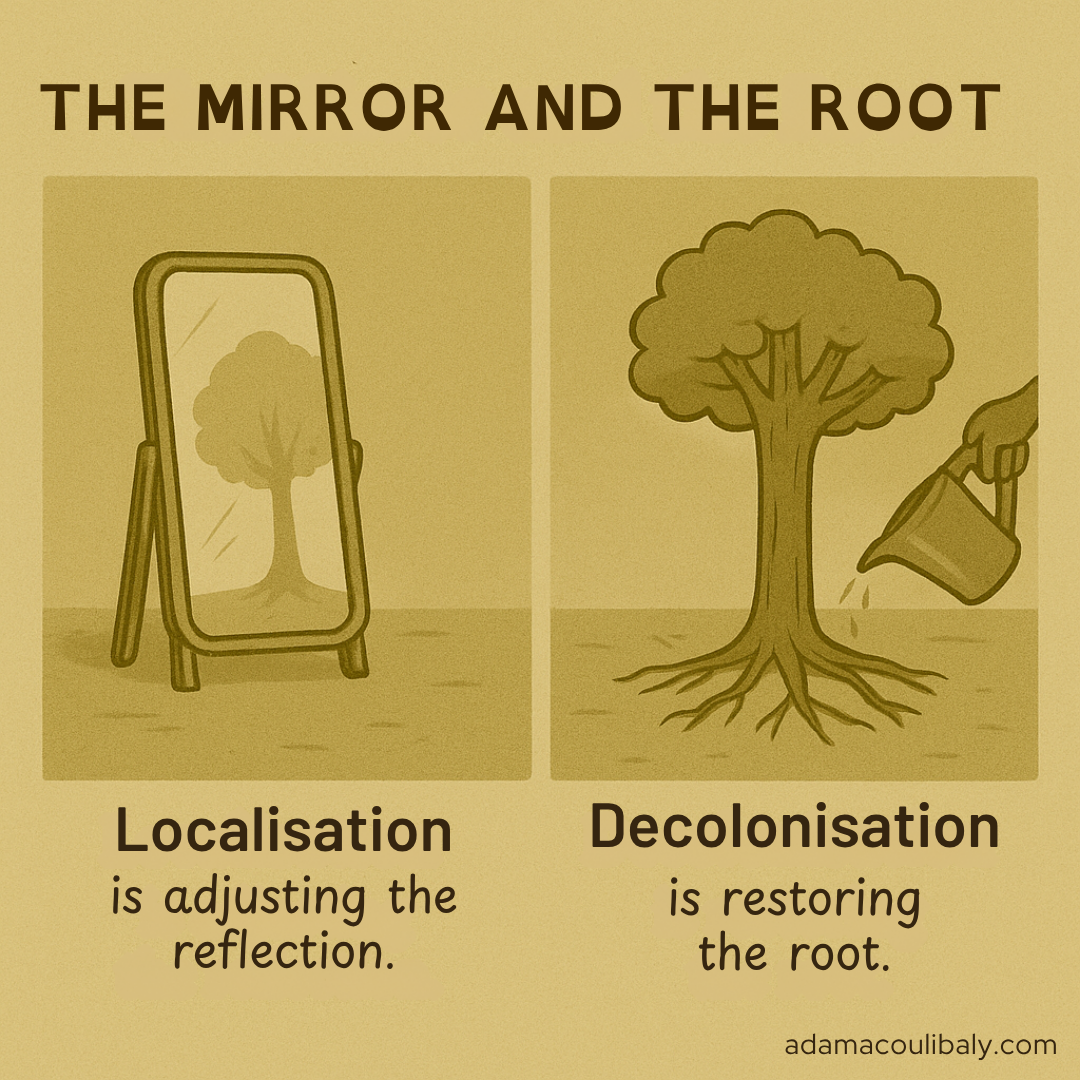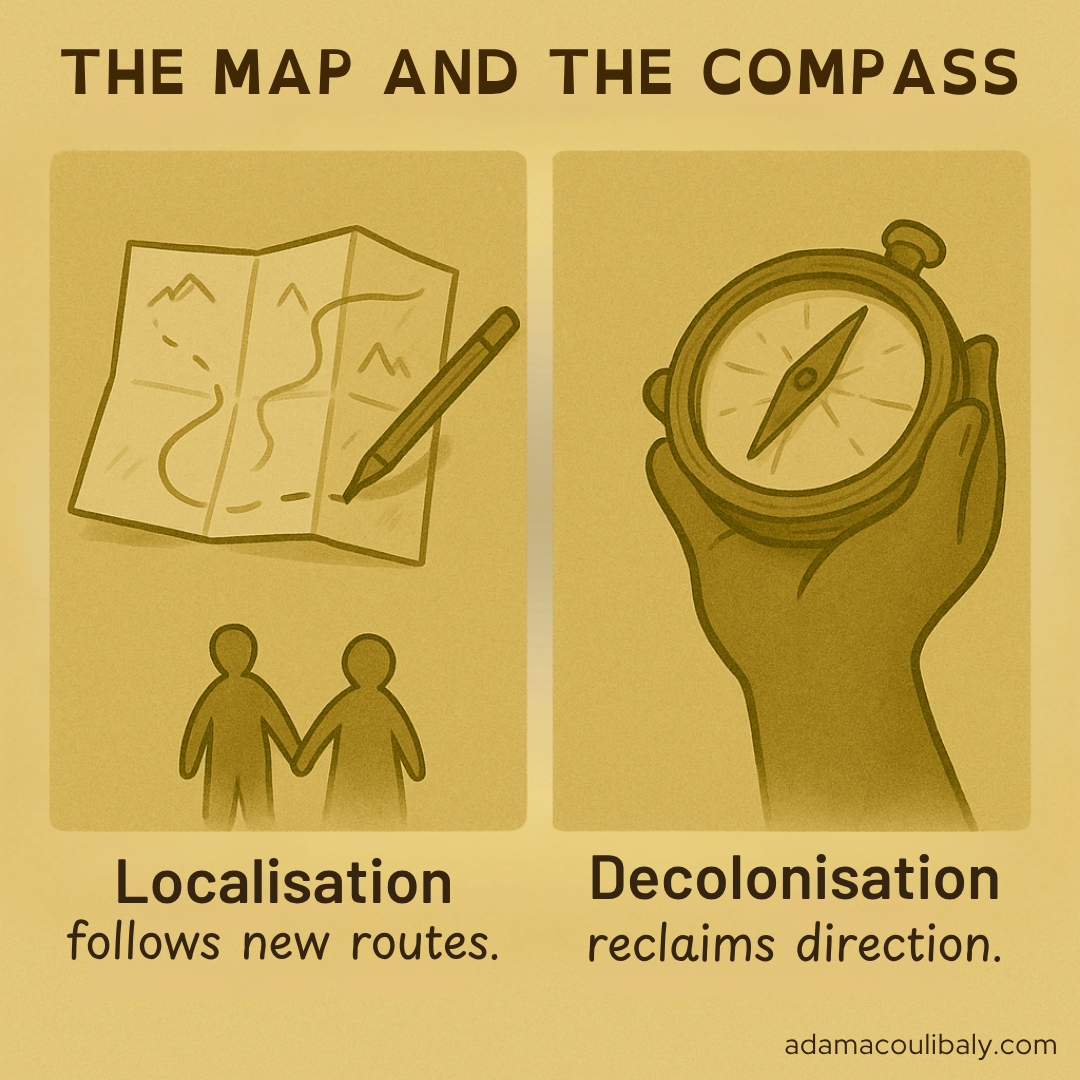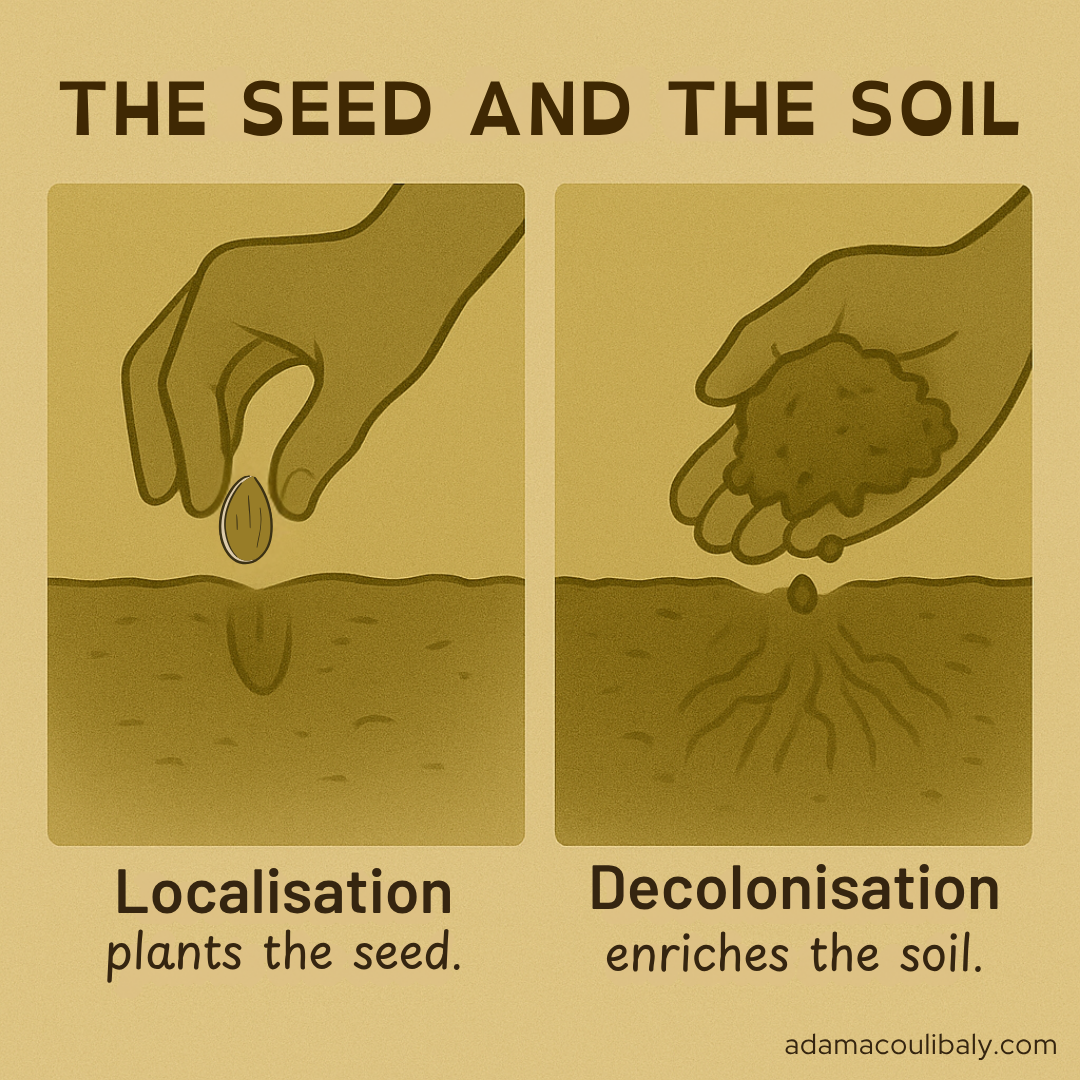Localisation and Decolonisation: Two Sides of the Same Coin?
Under the baobab, Tilé asks the questions that reveal where they meet, where they clash, and why they need each other.
PositiveMinds | Positive Stories | Edition 069
Illustrated by me (A. Coulibaly) with canva.com
Hello friends, I'm Tilé — Sun in Bambara in Mali — a wanderer and collector of metaphors, as well as a part-time interviewer when the conversation is too important to leave to chance. Today, I’m not in a studio or a conference hall. I’m under the baobab — a place where, in many African cultures, communities gather to listen, debate, pass on wisdom, and settle the questions that matter.
The baobab isn’t just a tree. It’s a living archive. Its shade has heard the voices of elders and the laughter of children; it has hosted hard truths and tender reconciliations. Here, conversation is not rushed. Here, words carry the weight of memory.
That’s why I’ve invited two heavyweights — Localisation and Decolonisation — to meet me here. They’re often spoken of in the same breath, as if one naturally leads to the other. But today, they’ll speak for themselves. We’ll explore where they meet, where they clash, and whether they can truly work together — from volume to soil, from the surface to the roots.
1. Louder Isn’t Freer
Tilé: Localisation, when you turn up the volume, is that enough to shift power? And Decolonisation, why isn’t being heard the same as being free?
Localisation: Turning up the volume is often the first step. Passing the microphone to local actors changes the energy in the room. It brings in accents, stories, and perspectives that were once absent. It says: “We are here. We have something to say.” For people who have long been excluded from the conversation, that visibility is not symbolic — it’s personal.
Decolonisation: True — but if the stage is still owned, managed, and lit by someone else, the script remains theirs. Louder doesn’t mean liberated. I ask whose voice it is, who set the terms, and why their framing still dominates. Without changing who defines the message, volume risks becoming performance, not power.
Tilé: So volume can make you heard — but not necessarily understood. Or, as my uncle says,
“If you shout into someone else’s megaphone, don’t be surprised if their echo drowns you out.”
2. Visibility Without Ownership
Tilé: Localisation, you put new stories in the spotlight. Decolonisation, what’s wrong with that?
Localisation: Visibility matters. Featuring local people in campaigns, translating content into local languages, and using authentic imagery are ways of saying: “We see you. We value you.” It’s not just PR — it’s about reclaiming space in the public imagination for those who’ve been erased.
Decolonisation: But if those stories are still packaged for donors, policymakers, or audiences far away, they can lose their original meaning. The narrative becomes shaped by what outsiders want to hear. True storytelling isn’t about visibility for someone else’s validation — it’s about memory, identity, and community. A story told at the campfire lives differently from one printed on a billboard.
Tilé: So, one of you wants the world to see it, the other wants the world to feel it. Or to put it simply:
“Visibility without ownership is like borrowing someone’s camera to take your family portrait — the picture may be yours, but the file still lives on their hard drive.”
3. Adaptation Isn’t Autonomy
Tilé: Localisation, you adapt to fit the local context. Decolonisation, is adaptation enough?
Localisation: Working with context is essential. I adjust plans, adapt methods, and reframe goals so they fit cultural and social realities. It’s about respecting what’s already there and shaping the work accordingly — making sure solutions feel local, not imported.
Decolonisation: But when the mould itself is set elsewhere — in donor capitals, policy frameworks, or organisational templates — adaptation is just compliance with a smile. I ask: who designed the mould? Why does it have this shape? And who benefits from keeping it? True autonomy means designing the mould from scratch, not merely tweaking what has been handed down.
Tilé: It’s the difference between decorating a cage and dismantling it. One lets you choose the colour of the bars; the other removes them entirely.
4. Polished Surfaces, Unhealed Roots
Tilé: Localisation, you adjust what’s visible. Decolonisation, you insist on digging deeper. Who’s right?
Localisation: People need to see themselves in the systems that affect them. Adjusting governance, leadership, hiring, and funding to make them more representative is not just symbolic — it builds trust, legitimacy, and accountability.
Decolonisation: Representation is valuable, but mirrors can deceive. If the frame holding the mirror is still owned elsewhere, we’re only improving the reflection of an unjust system. I work at the root: restoring histories erased, challenging inherited logics, repairing what was broken. Without that, the soil remains poisoned, no matter how clear the mirror may be.
Tilé: One of you polishes the mirror, the other uproots it entirely. Some days, I think you both need to meet halfway — clean the glass, but also check what’s growing behind it.
5. The Route vs. The Destination
Tilé: Localisation, you redraw the route. Decolonisation, you seem to want a different destination. Can you both be on the same journey?
Localisation: I make the route more relevant — shorter where it needs to be, winding where that makes sense, rooted in local hubs and led by local hands. It’s about making sure the journey feels like ours in the day-to-day.
Decolonisation: But if the destination is still defined by someone else — often far away — the route doesn’t matter. I want us to choose where we’re going, why we’re going, and how we’ll know we’ve arrived. Without that, we’re just taking a scenic detour to someone else’s endpoint.
Tilé: Sounds like one of you’s the GPS, the other decides which planet we’re heading to. And if the GPS thinks we’re going to the moon but the compass says Mars, we’re in for a long trip.
6. Seeds Need More Than Hope
Tilé: Localisation, you plant the seeds. Decolonisation, you talk about the soil. Which comes first?
Localisation: Planting is about recognising potential — nurturing local leadership, youth movements, and community-led change. It’s about trusting people to grow what’s right for them, not what someone else dictates.
Decolonisation: But if the soil is still depleted by extraction, history, and inequity, the best seeds will fail. I restore nutrients, return resources, and repair what has been taken. Justice must live in the ground before growth can flourish. Without that, planting is a ceremony without a harvest.
Tilé: One plants, the other makes sure the ground isn’t poisoned. Seems to me like both jobs are essential — unless you’re in the business of growing disappointment.
Final Reflections
Tilé: Before wrapping up under the baobab, I’d like each of you to share one final thought that you’d like to echo long after we leave this mat.
Localisation: Change begins where people feel seen, heard and trusted. If we can shift our everyday practices — our language, our leadership and the routes we take — then power becomes more of a reality and less of a promise. My work is to make that shift tangible.
Decolonisation: Power doesn't just need to shift. It needs to be returned. We can’t invite people into a house built on someone else’s foundations and expect them to call it home. True change means questioning the ground beneath us, restoring what was taken and rebuilding together on fair terms.
Tilé: Thank you both. We may use different tools and take different routes, but perhaps under the baobab we can agree that the work is unfinished until it is shared.
Closing
Tilé: Here’s what I’ve learned under the baobab today: Localisation opens the door. Decolonisation changes the house. One works within the frame, the other questions whether the frame should exist. They need each other — but only if they’re willing to work on the roots as well as the branches.
Because if we keep turning up the volume without changing the voice, painting the billboard without reclaiming the story, shaping the clay without redesigning the mould, polishing the mirror without healing the soil, following the map without holding the compass, or planting seeds in barren ground… We’ll be busy, but not transformed.
And transformation is the point.
If this conversation stirred something in you, explore more reflections, metaphors, and provocations in the Decolonisation and Localisation section of PositiveMinds.
#Decolonisation #Localisation #SystemsChange #PowerShift #NarrativeJustice #EquityAndGrowth #PledgeForChange #Charter4Change



